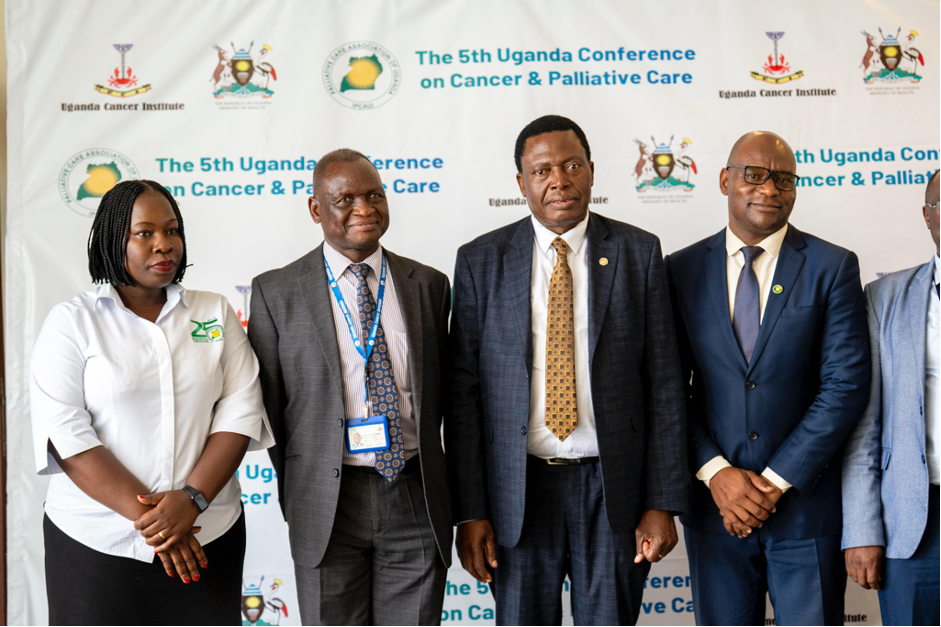The Ministry of Health, in partnership with the Uganda Cancer Institute (UCI) and the Palliative Care Association of Uganda (PCAU), has officially launched the 5th Uganda Conference on Cancer and Palliative Care, scheduled to take place from September 10th to 12th, 2025, at Speke Resort Munyonyo.
Held under the theme “Embracing Uniqueness and Empowering Communities,” the conference aims to promote integration of cancer and palliative care services in Uganda and across the East African region.
Speaking at the launch, Dr. Charles Olaro, Director General of Health Services, emphasized the importance of partnerships in addressing Uganda’s growing health burden.
Referring to Sustainable Development Goal 17 on multi-sectoral collaboration, he highlighted the critical roles played by stakeholders such as UCI, PCAU, civil society, and the media in delivering equitable care.
Dr. Olaro noted that Uganda registers approximately 36,000 new cancer cases annually, with over 24,000 resulting in death.
Alarmingly, only 20% of patients access treatment at the Uganda Cancer Institute, leaving the majority to die without care.
He explained that about a third of all cancers are preventable, another third curable, and the remaining manageable through palliative care making comprehensive service integration essential.
Uganda has made significant progress in cancer care infrastructure, including expanding UCI’s capacity to 365 beds, acquiring three modern linear accelerators for radiotherapy, and establishing a nuclear medicine facility with SPECT scan technology.
Decentralization is also underway, with regional cancer centers planned for Gulu, Arua, Mbale, and Mbarara.
Palliative care remains a central focus, with an estimated 500,000 Ugandans in need of such services annually, yet only 10–11% accessing them largely due to limited public awareness.
Dr. Olaro called for increased outreach and education, highlighting that over 230 accredited palliative care centers now exists in 107 districts, with free oral morphine available in public facilities.
He also commended Uganda’s global leadership, having integrated palliative care indicators into the national health information system, earning recognition from the World Health Organization.
Dr. Jackson Orem, Executive Director of UCI, praised the unique partnership between UCI and PCAU, describing it as the only one of its kind on the continent.
He emphasized UCI’s statutory role in coordinating national cancer control efforts under the UCI Act of 2016 and expressed gratitude to the Ministry of Health for continued support.
Dr. Orem also applauded Uganda’s policy of providing free cancer treatment and the consistent availability of essential medicines, noting that government funding has been secured for the rollout of regional cancer centers.
Mark Donald Mwesiga, Executive Director of PCAU, emphasized that palliative care goes beyond cancer treatment and is critical for managing other life-limiting illnesses such as cardiovascular disease, diabetes, HIV/AIDS, and sickle cell disease.
He noted that the upcoming conference will reflect this scope, with sessions addressing diverse conditions and care models.
He also paid tribute to the late Dr. Anne Merriman, founder of Hospice Africa Uganda, for her pioneering role in advancing palliative care across the continent.
A strong focus on survivorship is expected at the conference. Gertrude Nakigudde, Executive Director of the Uganda Women Cancer Survivors Association and a 23-year breast cancer survivor, emphasized the importance of including patient voices in scientific discussions.
She highlighted the stigma that survivors face and the need for post-treatment support systems.
Nakigudde welcomed the planned survivorship workshop and noted that over 77,000 Ugandans are currently living with cancer, many of whom are thriving due to improved access to care.
As the event concluded, Dr. Olaro called on the media to continue raising awareness, especially as the country moves toward an election season.
He urged Ugandans to adopt healthier lifestyles, avoid risky behaviors like smoking, and prioritize regular health screenings regardless of age.
He reaffirmed the Ministry’s commitment to delivering accessible, high-quality, and equitable care and pledged continued collaboration with partners in research, training, and service delivery.
With optimism and collective effort, organizers hope the upcoming conference will further strengthen Uganda’s position as a leader in cancer and palliative care across the region.
By Ben Musanje
13th Aug 2025
END

